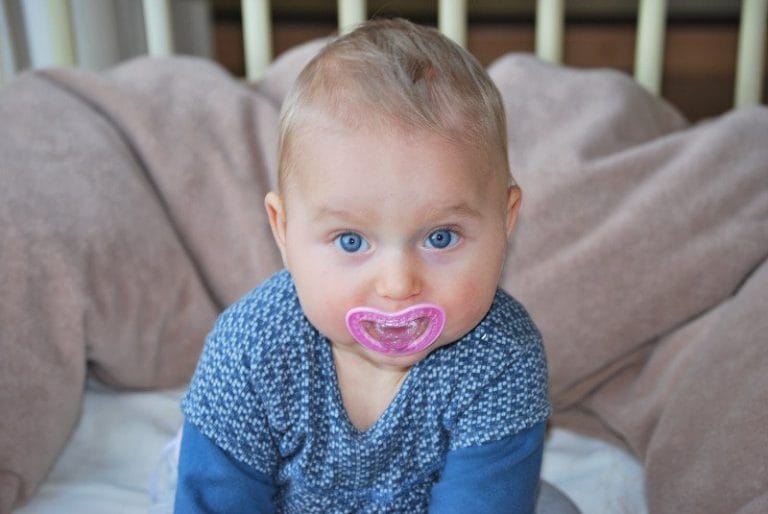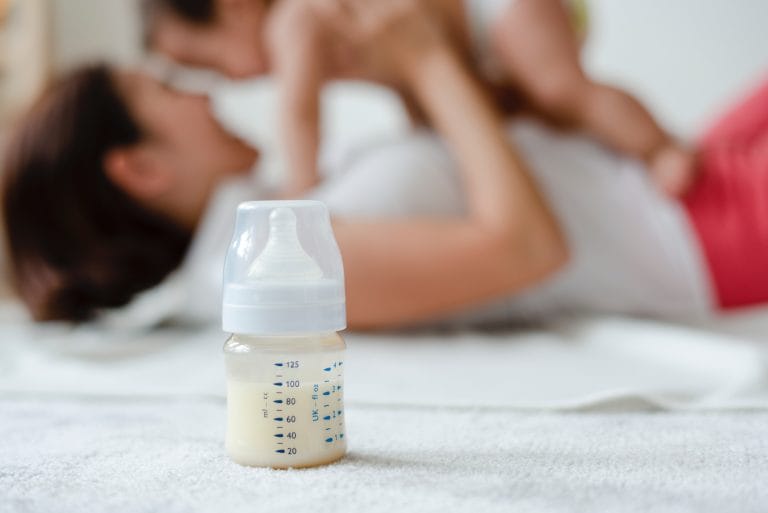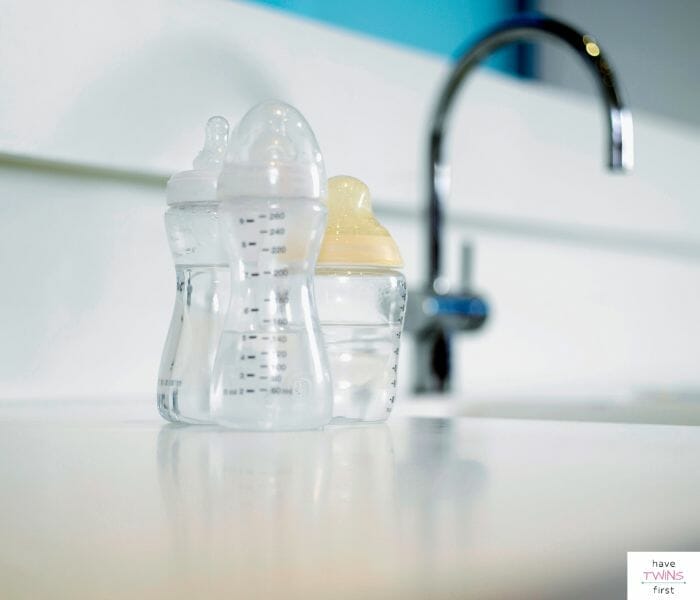Preparing for a new baby is exciting, but it can also feel overwhelming with so much to get done before your little one arrives. From setting up the nursery and washing tiny clothes to organizing baby essentials and preparing for birth, having a clear plan helps ease the transition.
Taking the time to prepare not only ensures you’re ready for those first few weeks, but also gives you peace of mind as you focus on bonding with your newborn. As a mom of 3, I have learned how helpful it is to have a list of things to get done in order to reduce overwhelm. That’s why I put together this helpful list of important things to do before your baby arrives so you can feel calm and confident.
Please note, there are affiliate links in this post. Read my privacy & disclosure policy at the bottom of this page to learn more.
Things To Do Before Baby Arrives List
Let’s jump right in to the list. But before we get started, if you would like this list as a printable checklist, you can get it by clicking here.
1 – Decorate Nursery
Decorating and setting up the nursery before your baby arrives will help you feel prepared and organized. Once your little one is here, time and energy become limited, making it harder to tackle big projects. Having the nursery ready ensures you can focus on bonding, recovery, and your baby’s needs.
Related: Use this printable Nursery Planner to get organized.
2 – Assemble Baby Gear
Assembling baby gear saves stress and confusion during those sleep-deprived early days. Set up items like the crib and stroller to ensure everything works properly and you know how to use it safely. Having gear ready to go means you can focus on caring for your newborn instead of fumbling with instructions.
3 – Install Car Seat
Install the car seat before your baby arrives so you are fully prepared for the first and most important ride home. Car seats can be tricky to set up correctly, and ensuring it’s installed correctly ahead of time gives you confidence that your baby will travel safely. Hospitals often require proof of a properly installed seat, so having it ready avoids last-minute stress and lets you focus on welcoming your newborn with peace of mind.
Related: The Best & Safest Car Seats for Newborns
4 – Prepare Freezer Meals
Make postpartum life easier by preparing freezer meals to ensure you have nourishing, ready-to-heat food on hand. With a newborn, time and energy for cooking are limited.
Having meals stocked helps you avoid stress, takeout, and skipped meals. It also supports your recovery and provides comfort during long days and nights, giving you more time to focus on bonding with your baby instead of worrying about what’s for dinner.
5 – Get Postpartum Supplies
Ensure you’re ready for recovery by getting postpartum essentials before your baby arrives. Items like pads, nursing bras, peri bottles, and comfortable clothing make healing and feeding easier during those first weeks. With your body adjusting and a newborn to care for, having everything on hand saves time, reduces stress, and allows you to focus on rest and bonding instead of last-minute store runs.
Related: Get this printable Postpartum Checklist to understand what you will need.
6 – Take a Birthing (Lamaze) Class
Taking a birthing class helps first-time moms feel informed, prepared, and confident about labor and delivery. Classes cover pain management, breathing techniques, and what to expect in different birth scenarios, reducing fear of the unknown.
They also teach partners how to provide support, making the experience more positive and connected. By understanding your options and practicing coping strategies, you can approach birth with less anxiety and greater peace of mind.
Related: If you are looking for a class to take, check out this online class that I highly recommend!
7 – Have a Birth Plan
Having a birth plan helps first-time moms feel empowered and organized by outlining their preferences for labor, delivery, and postpartum care. While birth can be unpredictable, a plan communicates your wishes to your care team, ensuring your voice is heard.
It also helps you think through pain management, interventions, and newborn care ahead of time. Even if things change, having a plan provides clarity, reduces stress, and supports a more positive birth experience.
Related: Use this simple printable Birth Plan Checklist to create the perfect plan for your needs.
8 – Pick a Name
Choosing your baby’s name early reduces stress during the overwhelming postpartum period when you’re sleep-deprived and adjusting to parenthood. It allows time for thoughtful consideration, partner agreement, and family input without pressure. You can practice using the name, ensure it flows well with your surname, and complete paperwork efficiently at the hospital.
Related: Use this printable Baby Names Idea List to organize the names you are considering.
9 – Get Newborn Essentials
Getting newborn essentials beforehand ensures you’re ready for baby’s immediate needs without the stress of last minute shopping. You’ll have time to research products, compare prices, and wash clothes and bedding. Having diapers, clothing, a safe sleep space, and feeding supplies ready lets you focus on bonding and adjusting to parenthood rather than scrambling for necessities.
Related: Get a FREE printable Baby Registry Checklist here!
10 – Finalize Maternity Leave Plan
Finalizing your maternity leave plan early ensures job security and financial stability during a vulnerable time. You’ll need to understand your company’s policies, complete required paperwork, and coordinate coverage for your responsibilities. Planning ahead allows you to maximize your benefits, budget for reduced income, and communicate clearly with your employer.
11 – Wash & Organize Baby’s Clothes
Washing baby clothes removes manufacturing chemicals and residues that could irritate newborn’s sensitive skin. Pre-organizing by size makes middle-of-the-night changes easier when you’re exhausted.
You’ll discover what you actually have versus what you still need, and can remove tags and arrange everything accessibly. Having clean, organized clothes ready means one less task during those demanding first weeks home.
12 – Figure Out Childcare Plan
Securing childcare early is crucial as quality providers often have long waitlists, sometimes months in advance. Researching options while pregnant allows you to tour facilities, check references, and compare costs without time pressure. Early planning also helps you budget, explore backup options, and potentially secure better rates or preferred spots at top-rated facilities.
13 – Setup Diaper Changing Areas
Setting up diaper stations in advance prevents fumbling with supplies during urgent changes. Newborns need 10-12 diaper changes daily, so having organized stations with diapers, wipes, creams, and disposal systems in key locations (nursery, living area) saves precious time and reduces stress.
14 – Take Maternity Photos (optional)
Maternity photos capture a fleeting, transformative moment you’ll never experience quite the same way again. They celebrate your body’s incredible ability to create life and document your journey to motherhood. These images become treasured keepsakes to share with your child, showing them how loved they were even before birth.
15 – Schedule Newborn Photos (optional)
Booking newborn photographers early ensures availability, as the best ones fill up months in advance. Newborn photos are time-sensitive and are ideally taken within 5-14 days when babies are sleepiest and still naturally curl up.
Researching and choosing a photographer while pregnant allows you to compare styles, prices, and reviews thoughtfully. Having this arranged before giving birth means you won’t miss capturing those precious, fleeting first moments.
16 – Learn How To Feed a Newborn Baby
Learn feeding basics beforehand, whether its breastfeeding positions, latch techniques, or bottle preparation. Newborns eat 8-12 times daily, so proper technique prevents pain, ensures adequate nutrition, and promotes bonding.
Taking a breastfeeding class or learning how to bottle feed a newborn, watching videos, and consulting lactation experts while you’re alert and focused is far more effective than trying to learn while exhausted, hormonal, and managing a crying, hungry baby who depends on you.
Related: I recommend this online breastfeeding class, so you can feel confident in what to do to successfully nurse your baby from day 1.
17 – Pack Hospital Bag
Packing your hospital bag by 36 weeks ensures you’re ready for unexpected early labor or emergency situations. You’ll have time to thoughtfully include comfort items, important documents, and your newborn’s coming home outfit without panic.
Labor can start suddenly. Contractions won’t pause while you scramble for phone chargers and insurance cards. Being prepared lets you focus on managing labor instead of worried packing.
Related: Get a FREE printable Hospital Bag Checklist here!
18 – Pick Baby’s Going Home Outfit
Select something special for baby’s first photos and memories. You’ll want multiple sizes ready since your baby’s measurements might surprise you.
Having the going home outfit washed, packed, and ready eliminates one more decision during recovery. It’s a small, but meaningful, detail that makes leaving the hospital more organized and celebratory rather than chaotic.
19 – Budget For Baby
Creating a baby budget early helps you understand the true costs of diapers, formula, childcare, and gear before they become urgent necessities. You’ll have time to save, adjust spending habits, and research cost-effective options.
Planning reveals if you need to modify maternity leave length or explore additional income. Knowing your budget provides peace of mind and prevents overspending.
20 – Read a Baby Book
Reading baby books during pregnancy prepares you with evidence-based knowledge about sleep, feeding, development, and common challenges. You’ll absorb information better when well-rested versus during newborn sleep deprivation. For a good general overview of what to expect as your baby grows during the first year I highly recommend What To Expect The First Year.
21 – Pick a Pediatrician
Selecting a pediatrician early ensures your baby receives immediate care after birth and hospital discharge. You’ll have time to verify insurance coverage and find someone whose philosophy aligns with yours.
Many hospitals require a pediatrician name before discharge. Additionally, your baby needs their first appointment within days. Researching while pregnant lets you ask other parents for recommendations, tour offices, and confirm the practice accepts newborns.
22 – Get Free Breast Pump Through Health Insurance
Ordering your insurance-covered breast pump early ensures it arrives before baby, as processing can take weeks. You’ll have time to navigate insurance requirements, compare approved models, and learn assembly without pressure. Having a pump ready is crucial if your baby has latch issues, you need to increase supply, or return to work.
Related: Use this form to get a FREE Breast Pump through your health insurance.
23 – Send Thank You Notes
Writing thank you notes during pregnancy ensures they actually get done. Finding time once your baby arrives becomes nearly impossible between feedings, diaper changes, and exhaustion. You’ll have energy to write thoughtful, personal messages rather than rushed generic ones.
Prompt notes show genuine appreciation. Plus, completing them early helps you track gifts received and lets gift givers know their presents arrived safely.
24 – Clean Your House
A clean, organized home reduces stress and infection risk during those exhausting first weeks. Tasks like scrubbing bathrooms, vacuuming under furniture, and sanitizing surfaces are physically demanding.
Starting fresh lets you focus on baby care rather than overwhelming household chores. You’ll eliminate dust, allergens, and germs when you have energy and mobility.
25 – Do a House Safety Check
While newborns aren’t mobile, baby-proofing early prevents scrambling later when your little one seems to suddenly start rolling, crawling, or grabbing. You’ll have time to research products, properly install gates and locks, and secure furniture to walls. Identifying hazards now (exposed outlets, sharp corners, toxic plants, etc.) gives you months to address them gradually.
Before we move on, you might want to grab these FREE printable Pregnancy Checklists. They include a baby registry, hospital bag, and trimester checklist and you can get them by clicking the button below.
Tips for Reducing Overwhelm Before Your Baby Arrives
Wow! Does that seem like a lot of things to get done? I don’t recommend tackling them all at once. Choose a few things each week and you will get through the list slowly but surely.
To help reduce your stress and overwhelm as an expecting parent, you can click on the items listed below that will assist with getting and staying organized as you prepare for the arrival of your newborn.
- Get printable Things To Do Before Baby Arrives, Birth Plan, and Postpartum Checklists – use in combination with these FREE pregnancy checklists to complete the bundle of all the pregnancy checklists you need.
- Or instead of the checklists, use a Pregnancy Planner or Pregnancy Spreadsheet.
- Take a Birthing Class.
- Take a Breastfeeding Class (if you plan to breastfeed)
- Sign up for this FREE Baby Box that contains over $80 in free baby supplies.

Getting “all the things” done before for your baby arrives doesn’t have to feel overwhelming when you break it down into simple steps.
From getting the nursery ready to stocking up on essentials and preparing for labor and delivery, each task helps you feel more confident and organized. Remember, it’s about creating a calm and supportive environment for you and your little one. By tackling these to-dos ahead of time, you’ll be able to welcome your baby with less stress and more joy. Good luck!







